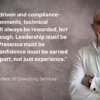With my good friend and colleague, Nancy Martini:
The role of sales has been transformed. Those who adjust their methods of operating to succeed in today’s environment will excel in 2012 and beyond.
The transformation began in 2002, when the Internet became an integral part of selling. From email, to automated supply chain, to cloud computing, to smart phones, to web conferencing, to search engines, to social media, we live in a world where the rules have changed for buyers and sellers. Now ten years later, we need to address the implications of this transformation on sales, sales management, and the future of selling. The following trends represent a highlight of this massive set of changes.
Trend #1: Buyers have more information. Today’s buyers can access a wealth of information in a matter of seconds, which changes their needs and expectations of interacting with sales. From websites, they can gather hard data on products, companies, competition, and industries, and they can gather soft data from friends, colleagues, and strangers (anonymous reviews) on social-media sites. Bottom line: buyers are theoretically better educated before they talk to a rep or, more dangerously, they think they are.
Trend #2: Selling is more demanding. Today’s buyer has less tolerance for old selling tactics, and today’s reps need to possess all the core sales skills of a top consultant: intelligence to assimilate information rapidly, behavioral fit to excel under pressure, stamina to endure the sales cycle, and resilience to continue in the face of adversity. Most of all, today’s sales reps require the wisdom to manage the sales process, rather than do something to the prospect.
Trend #3: Buyers are more risk averse. As the economy has become more unsettled, customer reactions have become more cautious. Spending is more conservative, internal controls have increased, decision making has moved up or become more complex, and reps have less access to those decision makers. Gatekeepers are more likely than ever before to create barriers to stakeholders.
Trend #4: Selling is becoming more professional. Much like the transformation of medicine in the early twentieth century, the specialization of selling has led to the creation of a professional class. The evidence is growing: more business schools are now offering sales courses, more sales reps are getting advanced degrees (MBAs), and there are now roughly 40 colleges and universities in the United States that offer a degree in sales. The overall specialization trend is toward education and professionalism – and that’s good for both buyers and sellers.
Trend #5: Selling is becoming more global. Globalization has been forcing the transformation of the sales role, and today, “global intelligence” and the ability to compete in a global marketplace is not a nice-to-have, it’s a must. Sales teams have to learn how to balance cultural and regional realities and social norms and language. The result is a sales environment that requires increased skills in team selling, “world selling” knowledge, higher reliance on sophisticated selling strategies, and an increased need for a true global business view.
Are you and your reps prepared to win amidst this sea of change? How many on your team possess the behaviors and skills needed to win? How do you know the difference between those who are barely hanging on and those who will flourish? These are questions that every sales team will face.
Fortunately, all of these conditions can be answered with effective sales skills, increased professionalism of reps, accurate coaching by sales managers, and a solid set of data to eliminate errors and take solid steps forward. In 2012 and beyond, successful companies will be those that leverage scientific data for accuracy, enable reps to succeed with relevant training and coaching, and create smarter reps to win in this transformational, technology-driven global economy.






